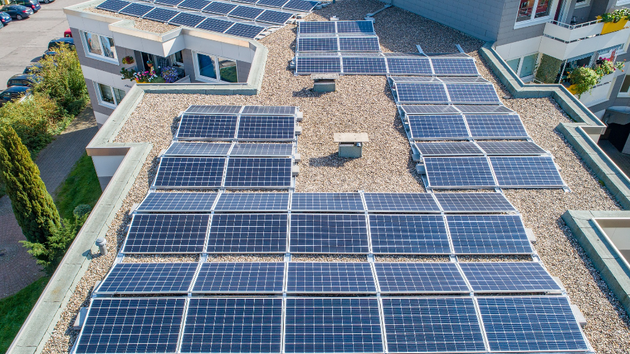Milos Hamovic, vice president of EFT Group - Investments possible only after electricity market liberalization
 Friday, 21.10.2011.
Friday, 21.10.2011.
 16:16
16:16
(Milos Hamovic)
The audit company Deloitte has recently released a list of Top 500 companies in Central Europe, which was compiled on the basis of their revenue from sales in 2010. That list confirms that energy companies are still dominant in this part of Europe. Our representative among giants - EFT Group, of which sales revenue in 2010 grew by 36.5%, reaching EUR 1.35 billion, is ranked 118th on that list.
In an interview for eKapija, Milos Hamovic, vice president of EFT Group, which currently implements two projects worth a total of about EUR 560 million, speaks about new investments, the announced liberalization of the electricity market, and other issues.
eKapija: How does EFT Group's investment plan for the following period look like?
- EFT is currently developing two projects in Bosnia-Herzegovina - Stanari steam power plant and Ulog hydroelectric power plant. We started the implementation of the Stanari steam power plant construction project in 2005 by acquiring a lignite mine in Stanari near Doboj. Construction of this 300 MW steam power plant requires an investment of EUR 500 million, and it is expected to be put in operation in late 2014.
The other project is the construction of Ulog hydroelectric power plant in the upper reaches of the Neretva river. That is a plant with the installed capacity of 35 MW, which puts it in the group of medium-sized hydroelectric power plants. The value of this investment is estimated at EUR 60 million. Research works have just been finished, and the construction of access roads has started.
It is not easy to provide funding for such facilities nowadays, which also explains why there are so few of them in our region. In order for EFT to implement these two projects, worth a total of EUR 560 million, the company needs to invest about EUR 150 million from its own sources, which is close to the amount of money currently available to EFT for investments. It does not make sense to enter projects that cannot be financed, especially during the financial crisis that, accompanied by risks typical for our region, demands large financial reserves. Of course, EFT has analyzed and found several projects with a big potential, but their implementation will be on hold until required funds for aforementioned projects are provided or partner companies for their development are found.
eKapija: Do you plan to make some new investment in the market of Serbia?
- We were considering the acquisition of the steam power plant Cukara in central Serbia, and we completed all research works and a feasibility study for that facility. Cukara is an unused mining basin. With the arrival of the crisis and drastic decrease in the prices of energy, this project has become economically not feasible. I believe that the prices of energy will recover and that this project will again become profitable in the near future.
We have not invested in other projects in Serbia so far, but we participated in a tender for the privatization of the underwater mine Kovin. Of course that EFT has various investment ideas for Serbia as well, but the current financial situation and crisis make such projects excessive on our list of priorities. Let us remind that, unlike some other investments, energy projects often take more than 10 years to implement.
eKapija: You mentioned potential partners. Which form of partnership would EFT find appropriate?
- Over the last ten years, EFT has been gaining significant experience in the energy sector in the region and beyond. We are proud to say that we have an excellent and unique team maintaining great relations with our clients for many years. We would seek a partner who primarily accepts to share our responsible approach to operations in the countries we are investing in, as well as our vision regarding the investment potential in the field of electric energy generation. Such partner is also expected to possess funds to co-invest in our joint projects and to rely on EFT to solve the problems that are specific for the region. I believe such partnership would create a synergy and give a fantastic result.
eKapija: What are your forecasts for the price of electricity?
- The electric energy we trade in is the energy from a high-voltage grid. The price of that electric energy develops in accordance with the market circumstances (surplus or shortage in countries of the region). Due to mutual connection between power supply systems, the reference price is most often the one in the nearest solvent market in the west, in Germany. It is quite different from the price paid by consumers in a country, both households and industrial consumers. Namely, that price should also include technical losses, a fee for the maintenance of the power supply system, power distribution costs, as well as investments in the development of the existing system for the sake of increased needs in the future. That price today in Serbia amounts to about RSD 7 per kWh for the population and about RSD 5 per kWh for the economy, whereas that price in western countries, which have a much more efficient system, goes up to RSD 25 per kWh for the population and RSD 12 per kWh for the economy. That means that, unfortunately, our real price should be higher.
It depends on the state whether the price of electricity will remain in the domain of social category or follow market trends to a certain extent. If the price gets that market component, the plan for which already exists, we can then expect a real progress in the field of investments as well.
eKapija: Do you believe in the announced liberalization of the electricity market, which is supposed to be completed until 2014? To what extend would that affect your operations?
- Every market liberalization produces a positive effect if carefully conducted. I hope that the year 2014 is a realistic deadline for several reasons. Even the old Energy Law allowed industrial consumers to choose their supplier of energy, but a non-market price policy has always made them to purchase energy from EPS, which they still do. In other words, it makes sense that none of consumers has found an interest in buying energy at a higher price when it can be bought at a lower price. With the new law, everything will depend on prices. We will have to wait and see whether the state will allow EPS to offer energy to the industry at the market price and finally make some profit.
It is not enough to say that EPS should charge the real price of energy. Such approach would, unfortunately, result in the closing of companies that have failed to stand up on their feet or those recovering from losses caused by the financial crisis. I believe that the state must make a constructive program and help companies in this transition period. A significant increase in the price of electricity in such short period of time is a big shock for the economy. Such shock for our weakened economy will produce very bad effects, among which are bankruptcy, inflation and unemployment.
eKapija: Are you satisfied with your operations in the region?
- I must say that the term 'region' does not always mean the same to us because we are now operating in more than 22 countries, but if we talk about the region spanning from Austria to Greece and from Italy to Ukraine, I am glad to say that we are very satisfied with our operations. Trade in electric energy develops at a very high rate, and all power supply systems and industrial consumers have very quickly learned to function at the market level. Competition is growing stronger, but that does not mean that we have to be more aggressive when bidding on a tender, but that a new potential for cooperation is emerging.
eKapija: What markets do you find the most promising?

- We started operating in the Baltic countries in 2011, as well as in Turkey, which connected to the Pan-European transfer network in mid-2011. EFT is still the leading cross-border trader in central and southeast Europe, and our operations are equally strong in all 22 countries. Aside from Germany, which is by far our largest market where we generate 34% of our sales revenue, all other countries account for less than 10% the overall sales each. However, we expect to generate profit from the sales in this region. Every electric power company or power supply company has its own specific demands, and each manufacturer has its own. The job of EFT, which has already become traditional, is to meet all these requests by, for example, harmonizing Ukraine's supply with Greece's demand, and all that thanks to our large and diversified portfolio. Equal presence in all countries gives us flexibility to offer competitive prices in most of the cases.
eKapija: Do you consider possible acquisitions in Serbia?
- We are considering all potentials, including the ones in Serbia, but we are not ready to start implementing any of our ideas at this moment. We are, of course, open to all offers.
If you ask me about the privatization of the Electric Power Company of Serbia (EPS), then I must say it is not part of our plan.
J.─É.
 New Roads d.o.o. Beograd
New Roads d.o.o. Beograd
 EFT London
EFT London
 Deloitte Touche Tohmatsu New York
Deloitte Touche Tohmatsu New York
 Deloitte Advisory d.o.o. Beograd
Deloitte Advisory d.o.o. Beograd
 Akcionarsko dru┼Ītvo Elektroprivreda Srbije Beograd
Akcionarsko dru┼Ītvo Elektroprivreda Srbije Beograd
Most Important News
06.04.2024. | Agriculture
Preconditions for Placement of Fresh Blueberries and Dried Plums in Chinese Market Secured

16.04.2024. | News
Jovan Ciric, Leasing Director Retail MPC Properties ŌĆō MPC Echo symbolizes our desire for good ideas and innovative endeavors to spread freely and bring about positive changes

16.04.2024. | News
10.04.2024. | Finance, IT, Telecommunications, Tourism, Sports, Culture
Creative Industry ŌĆō What This Serbian Economy Sector Worth EUR 2 Billion Encompasses

10.04.2024. | Finance, IT, Telecommunications, Tourism, Sports, Culture
17.04.2024. | Industry, Construction, Transport, Finance
Feka Automotive to build energy-efficient production facility ŌĆō EBRD approves EUR 15 million

17.04.2024. | Industry, Construction, Transport, Finance
16.04.2024. | News
Economy Fair in Mostar opens ŌĆō 26 companies from Serbia exhibiting

16.04.2024. | News
16.04.2024. | News
Polish chain Zabka to come to Serbia?

16.04.2024. | News


 Izdanje Srbija
Izdanje Srbija Serbische Ausgabe
Serbische Ausgabe Izdanje BiH
Izdanje BiH Izdanje Crna Gora
Izdanje Crna Gora


 News
News






